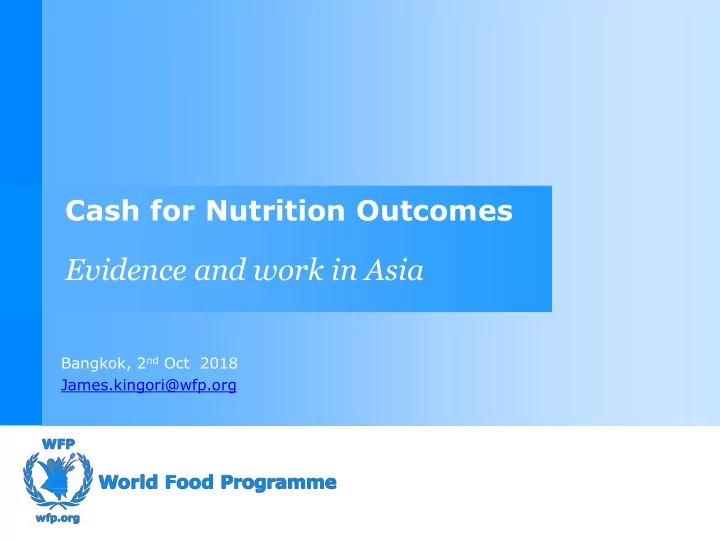

Cash for Nutrition Outcomes Evidence and work in Asia Bangkok, 2 nd Oct 2018 James.kingori@wfp.org
Cash: A tool for emergency & devt • Since the Grand Bargain agreement, 2016 World Humanitarian Summit, cash transfers is part of humanitarian assistance. • Cash transfers (CT) are efficient and effective in covering basic needs. Cash transfers offer dignity, choice and flexibility to affected populations’ food and nutrition security • Need for evidence on impact to support their programmes and policies.
What Do We Know About Cash for Nutrition Outcomes? Impact is affected by Cash can improve context and design. nutrition.
Evidence of cash transfer on nutrition outcome & determinant (pointers) Evidence of Areas of Inquiry nutrition outcomes Consistent evidence HH food consumption & Dietary of +ve impact diversity HH expenditure/ food expenditure Growing evidence HH economy; Use of preventive health of +ve impact services; Child wasting & stunting; Limited but HH caloric intake; WASH, mother/ consistent evidence caregiver dietary intake; Access to of +ve impact micronutrients; Child underweight No evidence/ HH coping strategies; care practices; inconsistent Caregivers physical health or evidence of impact empowerment
Designing Interventions to Maximize Nutrition Outcomes Transfer value supports nutrition year-round Sufficient Nutritious foods duration, are available, appropriate affordable & targeting & accessible timing Improved Communications diets of Context analysis to improve health target groups & formative & nutrition over a longer research period of behavior time
Evidence of cash transfer (CT)on program design & implementation features Evidence Area of inquiry of nutrition Growing Conditionality: No difference => Unconditional & conditional CT consistent Modality: Cash & voucher are better than food transfer at evidence increasing dietary diversity Amount of CT: Amount need to contribute to HH economy Limited but Complementarity: Cash plus other response consistent Cash delivery mechanism (cash vs mobile): no effect on WHZ; evidence electronic transfer preferred Targeting: Consider sex & age of child & caregiver Duration: Longer the duration improved nutrition Unintended effects: Indicator heterogeneity; e.g. HH dynamics Cost efficiency: CT/Voucher likely to be better In-kind food distribution No Recipient gender; timing of delivery; frequency; communication evidence & labelling; preferences & behaviour response, etc
WFP Research and Programming to Build Evidence Bangladesh Niger Pakistan Dominican Republic of Ethiopia Republic Congo
Stunting prevention Operational Research at Rahim Yar Khan; Punjab • Stakeholders: Agha Khan Univ; Benazir Income support Program, MOH, WFP • Objective: Effectiveness of nutrition interventions involving nutritious foods, cash-based transfer, and enhanced SBCC to prevent stunting among 6-24 month children in Rahim Yar Khan district • Formative research to develop the SBCC approach • Five arm randomized trial: (1) Control group (2) Unconditional Cash-only group; (3) Cash + SBCC group; (4) Cash + SNF group (5) Cash + SNF + SBCC group • Status: 1 st Consultation in Nov 2016; 1 st enrolment of study groups in April 2017
Evidence generation on stunting reduction in Balochistan • Objective: E vidence generation for stunting prevention through multisectoral approaches coupled with appropriate complementary practices. • Longitudinal study investigating control and study group of children within their 1000 days. SNFs, MNPs, BISP CBTs, health services, and education services provided by Lady Health workers; Data collection done by an independent study team. • Baseline established for various indicators.
Thank you! Questions? World Food Programme World Food Programme Oct 2 nd 2018
Recommend
More recommend